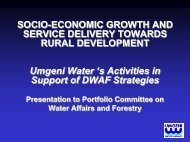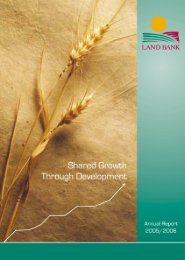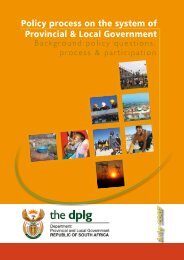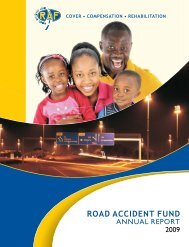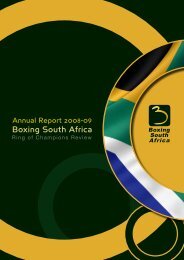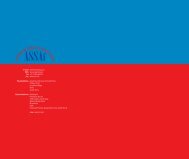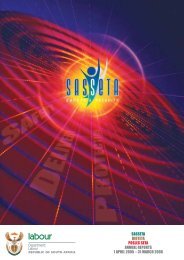Human Settlements Review - Parliamentary Monitoring Group
Human Settlements Review - Parliamentary Monitoring Group
Human Settlements Review - Parliamentary Monitoring Group
You also want an ePaper? Increase the reach of your titles
YUMPU automatically turns print PDFs into web optimized ePapers that Google loves.
<strong>Human</strong> <strong>Settlements</strong> <strong>Review</strong>, Volume 1, Number 1, 2010<br />
assets of the three richest people in the world<br />
alone exceed the combined GNP of all leastdeveloped<br />
countries and their 600 million<br />
people (Capra 2002).<br />
As Paul Hawken, Amory Lovins, and Hunter<br />
Lovins argue in Natural Capitalism, there<br />
is a better economy to be created that does<br />
not depend on drawing down natural capital,<br />
imposing costs on the poor or posterity,<br />
confusing prosperity with growth, and<br />
risking global catastrophe (1999). But the<br />
development of that economy will require<br />
clarity about the fair distribution of wealth and<br />
risk shrewd public policies. It will require us to<br />
relearn the art of frugality, sufficiency, sharing<br />
and neighborliness. It will require a bit of<br />
ingenuity to craft what Howard and Elisabeth<br />
Odum call a “prosperous was down” (2001).<br />
A shift is required from the goal of standard<br />
of living to that of quality of life, transforming<br />
the drive to simply get and consume into<br />
the profoundly different one of pursuing<br />
deep psychic fulfilment – a step forward,<br />
not backwards as it is too often portrayed.<br />
Achieving sustainability then requires attention<br />
to psychology and even spiritual issues,<br />
to satisfy values deeper than advertising<br />
induced desire. Sustainability is not only<br />
about curbing environmental abuse – it<br />
is more about enjoying a saner and more<br />
just way of life. The universe is not a dead<br />
clockwork mechanism but a living process,<br />
constantly unfolding and creative. A profound<br />
psychological impact of such a shift could help<br />
us to no longer feel alienated from the world,<br />
nor compelled to defend against this feeling<br />
through acquisitive consumption, but can<br />
instead disencumber ourselves to open up<br />
and feel an integral part of this astounding and<br />
benevolent planet.<br />
Perhaps in the end, it will not be a change in<br />
technology that will bring is to a sustainable<br />
future and to the development of a more<br />
responsible society, but a change of heart,<br />
a humbling that allows us to be attentive to<br />
nature’s lessons. As author Bill McKibben has<br />
pointed out, our tools are always deployed in<br />
the service of some philosophy or ideology. If<br />
we are to use our tools in the service of fitting<br />
in on Earth, our basic relationship to nature -<br />
even the story we tell ourselves about who we<br />
are in the universe – has to change.<br />
Environmentalism, architecture<br />
and the role of designers - from<br />
egosystem to ecosystem<br />
The environmental design disciplines –<br />
architecture along with urban design, regional<br />
planning and landscape architecture – will<br />
inevitably play a key role in the quest for<br />
sustainability. It is after all an environmental<br />
crisis that looms, and the design of the current<br />
built environment contributes immensely to<br />
the crisis, in its wastefulness of land, energy<br />
and commuting time and in the lifestyles it<br />
facilitates. It also constrains how much we can<br />
change these lifestyles.<br />
In terms of architecture and design,<br />
Peter Buchanan (2008) describes it “as<br />
sustainability’s greatest and exciting gift to<br />
return the profession to its purpose and dignity<br />
as it addresses very real and urgent issues so<br />
that it will inspire influence in the shaping of<br />
our environment and culture” (128).<br />
127



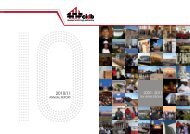
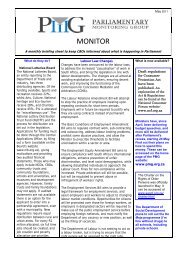
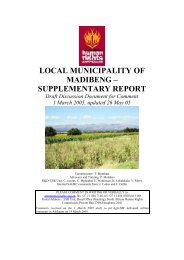
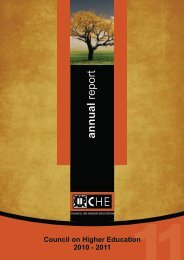
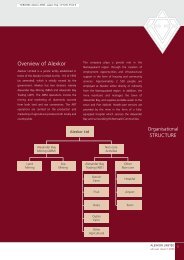
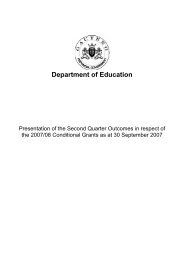
![National Research Foundation Annual Report 2008 / 2009 [Part 2]](https://img.yumpu.com/49774036/1/177x260/national-research-foundation-annual-report-2008-2009-part-2.jpg?quality=85)
